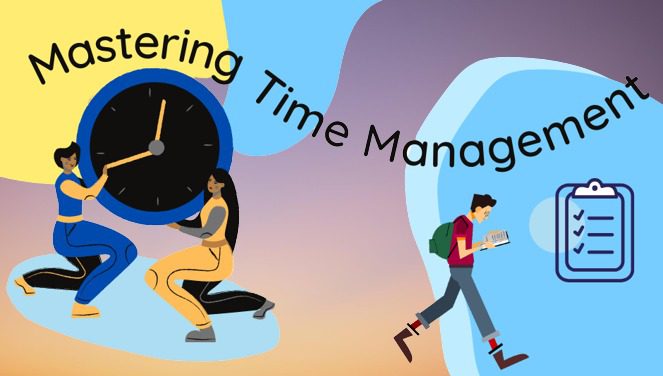Mastering Time Management: In today’s fast-paced world, time has become a precious commodity. It seems like there is always too much to do and too little time. However, with effective time management strategies, you can take control of your schedule, increase productivity, and reduce stress. In this article, we will explore a variety of techniques to help you master the art of time management and make the most out of your days.
Setting Clear Goals
One of the fundamental pillars of effective time management is setting clear goals. By defining specific, measurable, attainable, relevant, and time-bound (SMART) objectives, you create a roadmap for success. Break down your larger goals into smaller, actionable tasks that can be accomplished within a reasonable timeframe. This approach not only provides clarity but also allows you to prioritize your efforts based on their importance and urgency.
Creating a Schedule
A well-structured schedule is a vital tool for efficient time management. Develop a daily or weekly schedule that outlines your commitments and tasks. Allocate specific time blocks for different activities, whether it’s work, personal projects, or leisure. Utilize digital calendars, planners, or even old-fashioned pen and paper to keep track of your schedule. Having a visual representation of your time commitments helps you stay organized and ensures that you don’t overlook any important tasks.
Eliminating Time Wasters
We all have our fair share of time-wasting activities that hinder our productivity. Identify these distractions, whether it’s excessive social media scrolling, unnecessary meetings, or engaging in unproductive conversations. Implement strategies to minimize or eliminate these time wasters. Set boundaries, practice self-discipline, and develop the habit of focusing on high-value activities. Learn to say no to non-essential tasks or requests that may derail your progress.
Practicing Time Blocking
Time blocking is a technique that involves dedicating specific blocks of time to particular tasks or projects. By focusing on one task at a time, you can optimize your concentration and productivity. Set aside uninterrupted periods solely for important work, and avoid multitasking, which often leads to decreased efficiency. When you commit yourself to a designated time block, you train your mind to be fully engaged, leading to better results.
Utilizing Prioritization Techniques
Prioritization is an essential skill for effective time management. Various techniques can help you prioritize tasks based on their urgency and importance. The Eisenhower Matrix, for instance, categorizes tasks into four quadrants: urgent and important, important but not urgent, urgent but not important, and neither urgent nor important. By using such frameworks, you can identify critical tasks that require immediate attention and allocate time and resources accordingly.
Also Read: Los Angeles Hotel Employees Return
Applying the Pomodoro Technique
The Pomodoro Technique is a time management method developed by Francesco Cirillo. It involves breaking your work into focused intervals, typically 25 minutes long, called “Pomodoros.” After each Pomodoro, take a short break of around five minutes. After completing four Pomodoros, take a more extended break. This technique helps maintain your productivity by providing structured periods of work and allowing brief moments of rest and rejuvenation.
Delegating and Outsourcing
Recognizing when to delegate tasks to others is a crucial aspect of time management. Identify tasks that can be efficiently handled by someone else, whether it’s a colleague, team member, or outsourcing service. Effective delegation requires clear communication, trust, and collaboration. By delegating responsibilities, you free up your time to focus on more critical tasks that require your expertise and attention.
Practicing Self-Care and Rest
Taking care of yourself is essential for sustainable productivity. Neglecting self-care can lead to burnout, decreased motivation, and diminished creativity. Allocate time for rest, relaxation, and activities that bring you joy and rejuvenation. Remember that productivity is not just about constant work but also about maintaining a healthy work-life balance. By prioritizing self-care, you can enhance your overall well-being and approach your tasks with renewed energy and enthusiasm.
Conclusion of Mastering Time Management
Mastering time management is a journey that requires dedication and consistent effort. By implementing the strategies discussed in this article, you can gain control over your time, boost productivity, and reduce stress levels. Remember to set clear goals, create a schedule, eliminate time-wasting activities, practice time blocking and prioritization, utilize techniques like the Pomodoro Technique, delegate tasks when appropriate, and prioritize self-care. By incorporating these practices into your daily routine, you will unlock your full potential and achieve greater success in all areas of your life. Start taking control of your time today and embrace the benefits of effective time management.
Our Reader’s Queries
What are the 4 P’s of time management?
Achieving your goals is easier with the 4 P’s of time management: prioritize, plan, be productive, and stay positive. Prioritizing helps you focus on what matters most. Planning allows you to allocate resources for reaching specific objectives.
What are the first 4 secrets for mastering time management?
Discover these 4 key insights for optimizing your time management abilities: Time itself doesn’t require control – it’s your own actions that require guidance! Urgency does not necessarily signify significance. The most pressing tasks are often unanticipated. Accomplished individuals don’t simply pile on more tasks. Rather than claiming, “I lack the time,” prioritize effectively.
What are the five steps involved in mastering time management?
Implement these 6 suggestions to boost your productivity and minimize interruptions at work. Set alerts for your tasks, craft a daily schedule, allocate specific time limits to each task, fend off distractions, and establish a regular routine.
What is the golden rule of time management?
Organize your responsibilities Organizing your responsibilities is a crucial aspect of managing your time efficiently. Begin by making a list of all your responsibilities and then categorize them based on how crucial and pressing they are. Tackle the most critical responsibilities first, and then move on to the less urgent ones.

